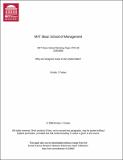| dc.contributor.author | Forbes, Kristin, J. | |
| dc.date.accessioned | 2011-08-29T15:04:48Z | |
| dc.date.available | 2011-08-29T15:04:48Z | |
| dc.date.issued | 2008-03-15 | |
| dc.identifier.uri | http://hdl.handle.net/1721.1/65425 | |
| dc.description.abstract | Why are foreigners willing to invest almost $2 trillion per year in the United States?
The answer affects if the existing pattern of global imbalances can persist and if the United States
can continue to finance its current account deficit without a major change in asset prices and
returns. This paper tests various hypotheses and finds that standard portfolio allocation models
and diversification motives are poor predictors of foreign holdings of U.S. liabilities. Instead,
foreigners hold greater shares of their investment portfolios in the United States if they have less
developed financial markets. The magnitude of this effect decreases with income per capita.
Countries with fewer capital controls and greater trade with the United States also invest more in
U.S. equity and bond markets, and foreign investors “chase returns” in their purchases of U.S.
equities (although not bonds). The empirical results showing a primary role of financial market
development in driving foreign purchases of U.S. portfolio liabilities supports recent theoretical
work on global imbalances. | en_US |
| dc.language.iso | en_US | en_US |
| dc.publisher | Cambridge, MA; Alfred P. Sloan School of Management, Massachusetts Institute of Technology | en_US |
| dc.relation.ispartofseries | MIT Sloan School of Management Working Paper;4701-08 | |
| dc.subject | home bias | en_US |
| dc.subject | foreign investment | en_US |
| dc.subject | portfolio flows | en_US |
| dc.subject | capital flows | en_US |
| dc.subject | U.S. current account | en_US |
| dc.subject | global imbalances | en_US |
| dc.subject | financial development | en_US |
| dc.subject | return chasing | en_US |
| dc.title | Why do Foreigners Invest in the United States? | en_US |
| dc.type | Working Paper | en_US |
